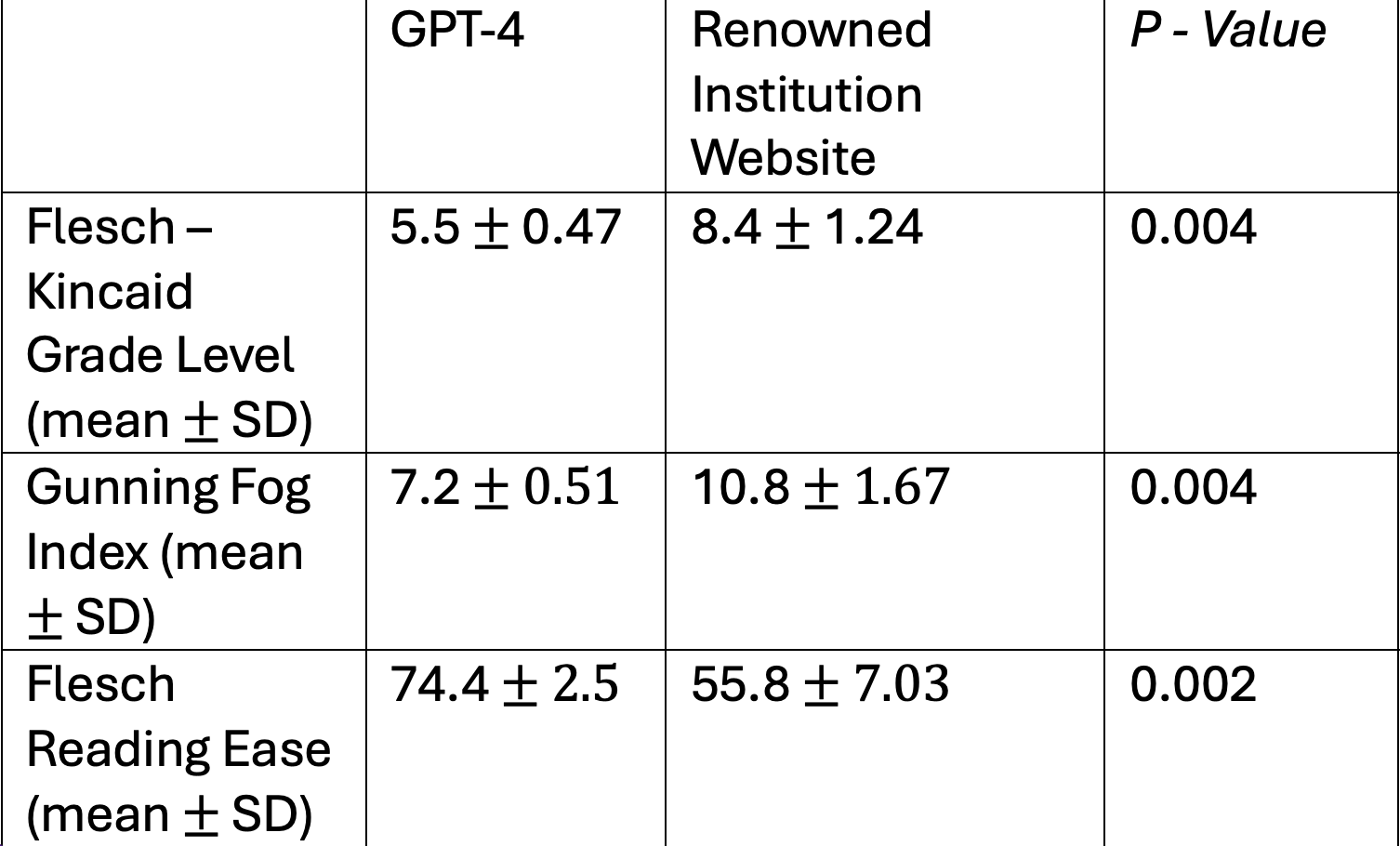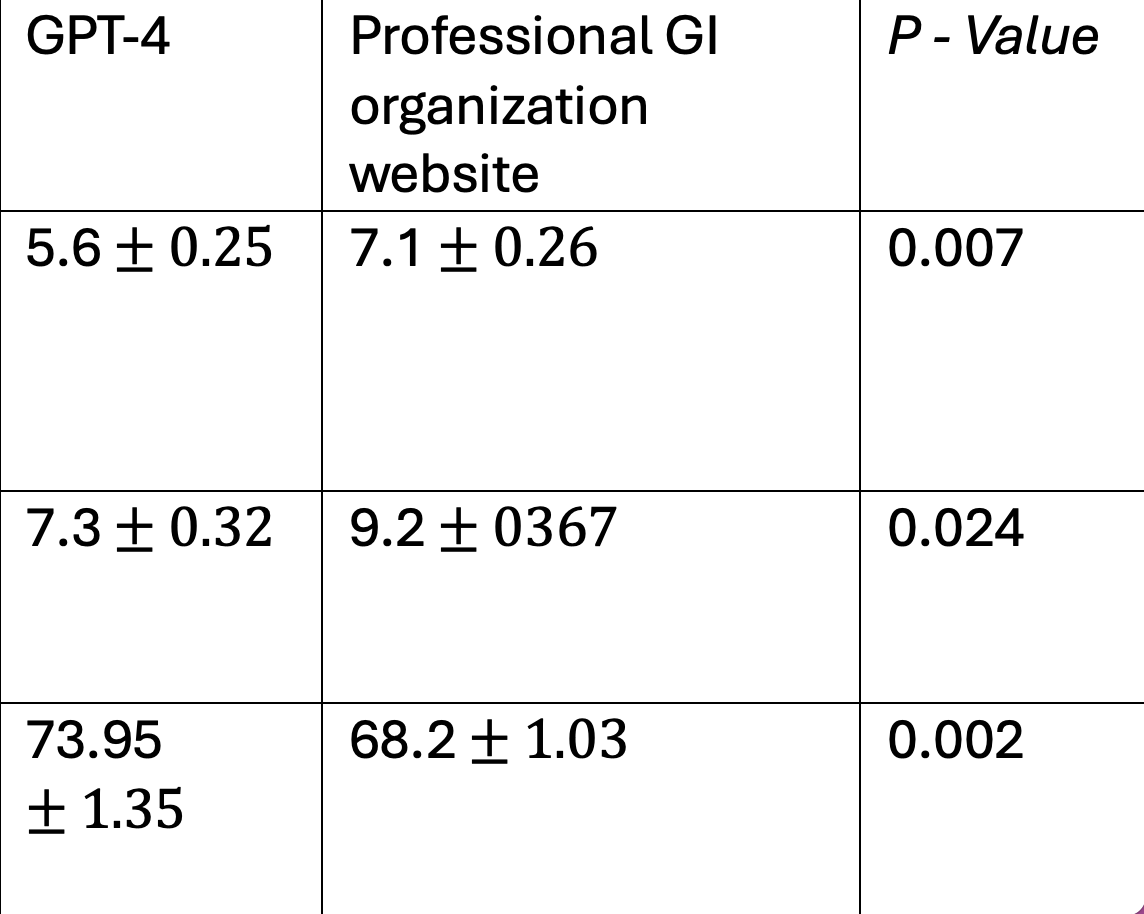Tuesday Poster Session
Category: Practice Management
P6200 - Enhance Understanding of Gastroenterology Procedures for Patient-Focused Care Using Advanced Artificial Intelligence Language Tools
Tuesday, October 28, 2025
10:30 AM - 4:00 PM PDT
Location: Exhibit Hall

Khalid Ahmed, MD (he/him/his)
University of Minnesota
Minneapolis, MN
Presenting Author(s)
Khalid Ahmed, MD1, Ayman Elawad, MD2, Elmkdad Mohammed, MD3, Marwa Salman, MBBS4, Abubaker Abdalla, MD5, Sreekant Avula, MBBS6, Ahmed Dirweesh, MD5, Mohamed Abdallah, MD7, Mohammad Bilal, MD, FACG8
1University of Minnesota, Minneapolis, MN; 2Massachusetts General Hospital, Boston, MA; 3The Wright Center for Graduate Medical Education, Scranton, PA; 4University of Medical Sciences and Technology, Minneapolis, MN; 5University of Minnesota Medical Center, Minneapolis, MN; 6Hennepin Healthcare, Minneapolis, MN; 7Corewell Health, Royal Oak, MI; 8University of Colorado Anschutz Medical Campus, Denver, CO
Introduction: This study evaluates the ability of Generative Pre-trained Transformer 4 (GPT-4) to generate clear and accessible explanations for commonly performed gastroenterology (GI) procedures to enhance patient understanding.
Methods: Seven common GI procedures were selected, and GPT-4 was prompted to produce patient-friendly educational material for each. Readability was assessed using established metrics, including the Flesch-Kincaid Grade Level, Gunning Fog Index, and Flesch Reading Ease. These metrics were analyzed through the online platform Readable.com, a widely used tool for readability analysis that applies validated algorithms to assess text comprehensibility. For comparison, procedural educational materials were sourced from credible websites of a renowned medical institution and a professional GI organization, both recognized for their evidence-based and patient-centered content. A paired t-test was conducted to statistically compare the readability scores between GPT-4-generated materials and the reference materials, determining whether GPT-4 content met or exceeded the readability standards of these established resources.
Results: GPT-4 demonstrated significantly superior readability metrics compared to both the renowned institution and professional GI organization websites (Tables 1, 2). The Flesch-Kincaid Grade Level was significantly lower for GPT-4 instructions, indicating excellent readability at approximately a 5th to 6th-grade level compared to 8th to 9th grade for the renowned institution (5.5 ± 0.47 vs. 8.4 ± 1.24, P = 0.004). Similarly, the Gunning Fog Index was notably lower for GPT-4, suggesting clearer text (7.2 ± 0.51 vs. 10.8 ± 1.67, P = 0.004 for the renowned institution; 7.3 ± 0.32 vs. 9.2 ± 0.367, P = 0.024 for GI organization). The Flesch Reading Ease score was significantly higher for GPT-4, reflecting easier readability (74.4 ± 2.5 vs. 55.8 ± 7.03, P = 0.002 for renowned institution; 73.95 ± 1.35 vs. 68.2 ± 1.03, P = 0.002 for GI organization).
Discussion: Results indicate that GPT-4-generated GI procedure instructions can be more accessible and easier to understand for the public. Our study highlights the potential of artificial intelligence language tools in serving as an avenue to improve patient procedural understanding and address disparities in health literacy. Further validation through qualitative assessment, including surveys involving both clinical and non-clinical assessors, is needed to ensure the reliability and practical utility of these materials.

Figure: Table 1. Statistical comparison of readability assessment from GPT-4 with the Renowned Institution website.

Figure: Table 1. Statistical comparison of readability assessment from GPT-4 with the Professional GI organization website.
Disclosures:
Khalid Ahmed indicated no relevant financial relationships.
Ayman Elawad indicated no relevant financial relationships.
Elmkdad Mohammed indicated no relevant financial relationships.
Marwa Salman indicated no relevant financial relationships.
Abubaker Abdalla indicated no relevant financial relationships.
Sreekant Avula indicated no relevant financial relationships.
Ahmed Dirweesh indicated no relevant financial relationships.
Mohamed Abdallah indicated no relevant financial relationships.
Mohammad Bilal: Boston Scientific – Consultant. Cook endoscopy – Paid speaker. Steris Endoscopy – Consultant.
Khalid Ahmed, MD1, Ayman Elawad, MD2, Elmkdad Mohammed, MD3, Marwa Salman, MBBS4, Abubaker Abdalla, MD5, Sreekant Avula, MBBS6, Ahmed Dirweesh, MD5, Mohamed Abdallah, MD7, Mohammad Bilal, MD, FACG8. P6200 - Enhance Understanding of Gastroenterology Procedures for Patient-Focused Care Using Advanced Artificial Intelligence Language Tools, ACG 2025 Annual Scientific Meeting Abstracts. Phoenix, AZ: American College of Gastroenterology.
1University of Minnesota, Minneapolis, MN; 2Massachusetts General Hospital, Boston, MA; 3The Wright Center for Graduate Medical Education, Scranton, PA; 4University of Medical Sciences and Technology, Minneapolis, MN; 5University of Minnesota Medical Center, Minneapolis, MN; 6Hennepin Healthcare, Minneapolis, MN; 7Corewell Health, Royal Oak, MI; 8University of Colorado Anschutz Medical Campus, Denver, CO
Introduction: This study evaluates the ability of Generative Pre-trained Transformer 4 (GPT-4) to generate clear and accessible explanations for commonly performed gastroenterology (GI) procedures to enhance patient understanding.
Methods: Seven common GI procedures were selected, and GPT-4 was prompted to produce patient-friendly educational material for each. Readability was assessed using established metrics, including the Flesch-Kincaid Grade Level, Gunning Fog Index, and Flesch Reading Ease. These metrics were analyzed through the online platform Readable.com, a widely used tool for readability analysis that applies validated algorithms to assess text comprehensibility. For comparison, procedural educational materials were sourced from credible websites of a renowned medical institution and a professional GI organization, both recognized for their evidence-based and patient-centered content. A paired t-test was conducted to statistically compare the readability scores between GPT-4-generated materials and the reference materials, determining whether GPT-4 content met or exceeded the readability standards of these established resources.
Results: GPT-4 demonstrated significantly superior readability metrics compared to both the renowned institution and professional GI organization websites (Tables 1, 2). The Flesch-Kincaid Grade Level was significantly lower for GPT-4 instructions, indicating excellent readability at approximately a 5th to 6th-grade level compared to 8th to 9th grade for the renowned institution (5.5 ± 0.47 vs. 8.4 ± 1.24, P = 0.004). Similarly, the Gunning Fog Index was notably lower for GPT-4, suggesting clearer text (7.2 ± 0.51 vs. 10.8 ± 1.67, P = 0.004 for the renowned institution; 7.3 ± 0.32 vs. 9.2 ± 0.367, P = 0.024 for GI organization). The Flesch Reading Ease score was significantly higher for GPT-4, reflecting easier readability (74.4 ± 2.5 vs. 55.8 ± 7.03, P = 0.002 for renowned institution; 73.95 ± 1.35 vs. 68.2 ± 1.03, P = 0.002 for GI organization).
Discussion: Results indicate that GPT-4-generated GI procedure instructions can be more accessible and easier to understand for the public. Our study highlights the potential of artificial intelligence language tools in serving as an avenue to improve patient procedural understanding and address disparities in health literacy. Further validation through qualitative assessment, including surveys involving both clinical and non-clinical assessors, is needed to ensure the reliability and practical utility of these materials.

Figure: Table 1. Statistical comparison of readability assessment from GPT-4 with the Renowned Institution website.

Figure: Table 1. Statistical comparison of readability assessment from GPT-4 with the Professional GI organization website.
Disclosures:
Khalid Ahmed indicated no relevant financial relationships.
Ayman Elawad indicated no relevant financial relationships.
Elmkdad Mohammed indicated no relevant financial relationships.
Marwa Salman indicated no relevant financial relationships.
Abubaker Abdalla indicated no relevant financial relationships.
Sreekant Avula indicated no relevant financial relationships.
Ahmed Dirweesh indicated no relevant financial relationships.
Mohamed Abdallah indicated no relevant financial relationships.
Mohammad Bilal: Boston Scientific – Consultant. Cook endoscopy – Paid speaker. Steris Endoscopy – Consultant.
Khalid Ahmed, MD1, Ayman Elawad, MD2, Elmkdad Mohammed, MD3, Marwa Salman, MBBS4, Abubaker Abdalla, MD5, Sreekant Avula, MBBS6, Ahmed Dirweesh, MD5, Mohamed Abdallah, MD7, Mohammad Bilal, MD, FACG8. P6200 - Enhance Understanding of Gastroenterology Procedures for Patient-Focused Care Using Advanced Artificial Intelligence Language Tools, ACG 2025 Annual Scientific Meeting Abstracts. Phoenix, AZ: American College of Gastroenterology.
